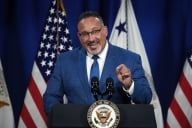You have /5 articles left.
Sign up for a free account or log in.
The attempt by Joe Biden, the presumptive Democratic presidential nominee, to unify his party with former challenger Bernie Sanders brought no major surprises in higher education policy.
A 110-page set of policy recommendations on a range of issues from climate change to education, crafted by representatives of both campaigns, called for canceling up to $10,000 in student debt relief per borrower during the coronavirus pandemic.
That’s far short, though, of Sanders’s plan to cancel all of the nation’s $1.6 trillion in student debt.
In addition, the joint proposal repeated Biden's previous proposal to excuse those making less than $25,000 from making monthly payments on student loans, without interest. For those making more, payments would be capped at 5 percent of their discretionary income. For both groups, any remaining loan balances will be forgiven after 20 years.
The task force also recommended that borrowers be able to have their students loans discharged through bankruptcy. And the recommendations reiterated Biden’s call to make tuition at community colleges and four-year universities free for those making less than $125,000, including undocumented students.
“Democrats believe that everyone should be able to earn a degree beyond high school, if they choose to, without money standing in the way,” the recommendations said. The task force also recommended doubling the size of federal Pell Grant awards, another position Biden had already taken.
In addition, the task force vowed to increase federal funding for programs that help first-generation college students, students with disabilities, veterans and other underrepresented groups apply to and complete college. It also called for providing grants to historically Black colleges and other institutions serving minorities.








